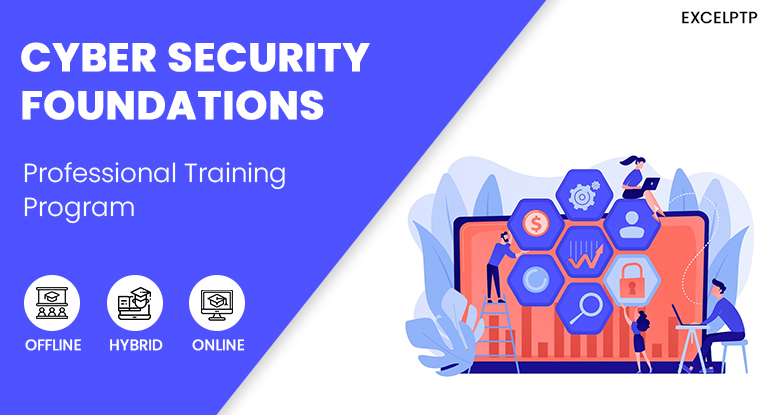
| Course Level: | Beginner to Advanced |
| Course Duration: | 4 Months | 8 Months |
| Training Days: | Monday to Friday |
| Training Time: | 4 hours / Day | Regular Office Time |
| Course Mode: | IN-class (Offline) at our premises |
| Course Type: | JOB oriented training |
| Course Start On: | On Registration | Admission |
| Class Size: | 1 to 1 | No Groups| No Batch |
COURSE BENEFITS
-
Considering is your last training: We assure for knowledge, so once your get job then your training will end.
-
Know your skills:Choose/Suggested a technology what you can do best.
-
Authenticate your skills: Entire course is on industrial practice so awarded with experience latter on placement.
-
Be highest paid fresher:We invented a unique model to get the job with highest starting salary, if you get good offer then US, you can join to them.
-
We don’t bind your ability: No specific course content, learn as much as you can, beyond the topics it helps to become logically sound.
Importance of cybersecurity
Evolution of cyber threats
Cybersecurity roles and responsibilities
Confidentiality, integrity, and availability
Risk management
The Cybersecurity Foundations Course provides an introduction to the fundamental concepts, principles, and practices of cybersecurity. This course is designed for individuals who are new to the field of cybersecurity and want to establish a solid understanding of the core concepts and techniques used to protect information systems from cyber threats.
Malware: viruses, worms, ransomware
Phishing and social engineering attacks
Hacking techniques: SQL injection, cross-site scripting (XSS)
Backdoors, Countermeasures etc
Network infrastructure: routers, switches, servers
Operating systems and software vulnerabilities
Human factors and insider threats
Denial of Service (DoS) attacks
Man-in-the-Middle (MitM) attacks
Password cracking and brute-force attacks etc
Risk management principles
Vulnerability assessment and penetration testing
Security controls and mitigation strategies
Symmetric and asymmetric encryption
Digital signatures and certificates
Public key infrastructure (PKI) etc
Firewalls and Intrusion Detection Systems (IDS)
Virtual Private Networks (VPNs)
Wireless network security
Software engineering
Security guidelines
Software vulnerabilities
Common software vulnerabilities
Best practices for secure coding
Software development life cycle (SDLC) and security considerations
Access control models: discretionary, mandatory, role-based
Multi-factor authentication
Identity and access management (IAM)
Incident response planning
Detection and containment of cybersecurity incidents
Forensics and incident investigation
Laws and regulations in cybersecurity
Privacy and data protection
Ethical hacking and responsible disclosure
Cryptography
Principles of permissions and Steganography
What is identity management?
Personally identifiable information
Authentication factors
Directory services and Kerberos
Password policies
Password assessment tools
Password managers
Group accounts and Service accounts
Federated identities
Identity as a Service etc
Monitoring vs. logging
Monitoring/logging benefits
What is physical security?
Defense in depth
Types of physical security controls
Device security
Human security
Security policies
Equipment tracking
No prior experience in cybersecurity is required. Basic computer literacy and familiarity with networking concepts will be beneficial and This course outline is intended as a general guide and may be customized to meet specific training objectives by trainer to trainer and candidates to candidates and The course will be delivered through a combination of lectures, hands-on exercises, case studies, and discussions.
Individuals seeking an introductory course in cybersecurity
Professionals transitioning into cybersecurity roles
Managers and executives responsible for information security
Students and enthusiasts interested in cybersecurity as a career
Basic knowledge of scripting and programming (any graduate)
LEARN WHICH BEST SUITS YOU
No limits on learning, no limits on duration, no limits on salary, no limits on interviews, learn as much as you can & get ready for your first job.
4 MONTHS TRAINING(CODE :- PTP 4)
-
4 months training duration
-
Monday to Friday (04 hours / Day)
-
Only practical based training
-
Individual 1 to 1 training
-
Professional developers as trainer
-
Stipend provide based on performance
-
Confirmed job – on-job training program
-
Diploma/Graduate (Any Stream), Career Changers & IT Enthusiasts.
12 MONTHS TRAINING(CODE :- PTP 12)
-
Up to 12 Months or Until Placement
-
Monday to Friday (full day Adjusted Based on Work Opportunity)
-
Live Work-Based Training with a Collaborative Team
-
1 to 1, Real-World Project Experience & Industry-Standard Skills
-
Unlimited Placement Support with Dual Job Opportunities
-
Industry Diploma Recognized as Experience + Training Certificate
-
Join as a Fresher, Graduate as an Experienced Professional Developer
-
10+2, Diploma/Graduate (Any Stream), Career Changers & IT Enthusiasts.






















